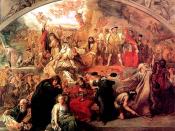February 28, 2002
Shakespearian Slam Dancing Thankz to KMFDM
Whether it?s the thrashing of the heavy-metal guitars or the delicate disposition of a few tender words, a song can constrict an audience with an invoking message of passion. The modern day song, "Truth," by KMFDM, contains comparable likeness to Shakespeare's, "Sonnet 30." The two songs, although written in different periods of time and in variable fashions, embody similar topics concerning memories of the past, the briefness of mortality, and the human recollections that allow earthly pains to be laid to rest.
The resurfacing of nostalgic events in the artists' lives is one of the main subjects within the under layers of the text. Both openly reveal "sessions of sweet silent thought" (1) that KMFDM expresses in terms as "what you hide and conceal" (1). The artists also experience their histories that were put in the deep recesses of the mind.
"Every urge" (5) and "old woes new" (4) are allegorical symbols for their dark, unbearable memories. These "losses are restored" (14) and suppress themselves when "Night shall overtake" (22) as the climax of "sorrows end" (14). The result of the flashbacks led KMFDM and Shakespeare to convey a purposeful message about reality.
The succulence of the flesh is an irreplaceable intoxication. An inherent value of living life to its fullest is a gratification that KMFDM and Shakespeare agree upon. Life, no matter how seemingly hopeless, can yield fruits and divine delights beyond godly intervention. "Precious friends" (6) and "Take what you're being given" (12) are examples of the pervading message within the texts. Although riveting in ecstasy, time on earth can also reflect the wastefulness of being idle. Shakespeare complains of the "dear time?s waste" (4), as he reflects upon his worries. KMFDM, coincidentally, remarks that the violent...


